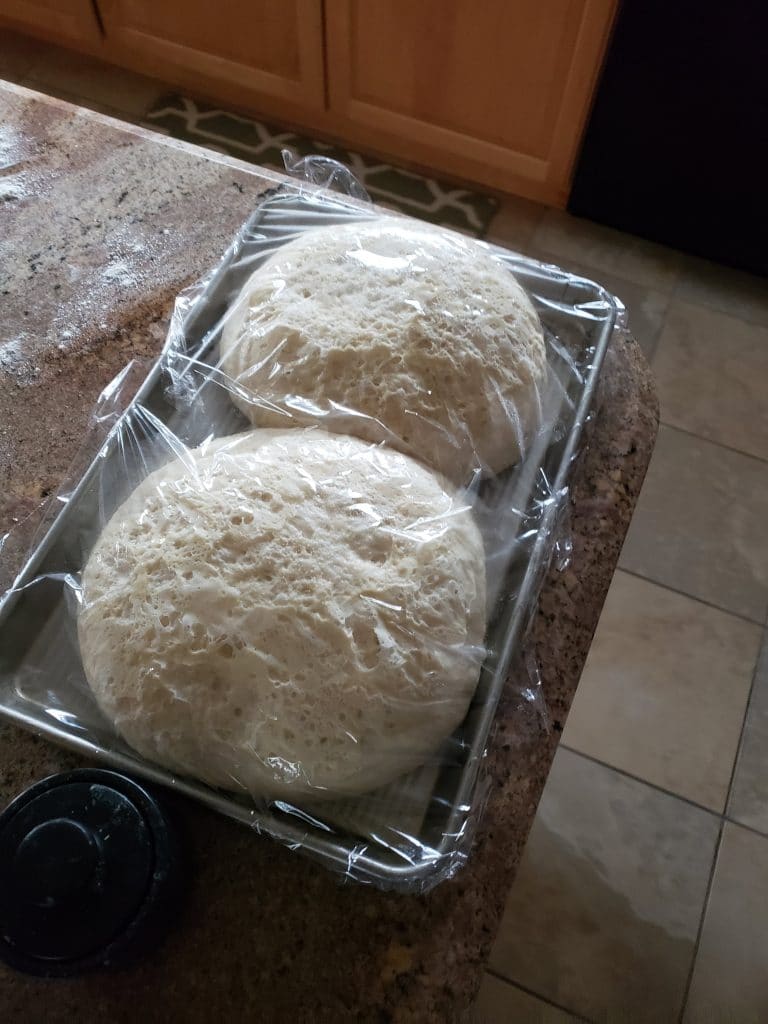Making pizza dough at home often has a little bit of trial and error, but it’s absolutely worth learning how to do properly. If you’ve ever made pizza at home, you’ll know how easy it is to forget about the pizza dough for hours, only to come back to a huge, bubbly, soft dough. So, this raises the question of how long a pizza dough can sit out.
Pizza dough can typically sit out for four hours without over-proofing. However, there is a big caveat to this. The answer unfortunately depends on ambient temperature, the amount of yeast, and the temperature of water used when mixing the dough. For example, dough could proof for 24 – 48 hours without over-proofing if you use cold water and leave the dough in your fridge overnight.
This happens because cold water doesn’t allow the yeast to activate fully, so the proofing stage becomes longer. Using less yeast in your pizza dough will also have a similar effect.
That said, there are several methods you can use to ensure that your precious pizza dough doesn’t overprove. Before I tell you about them, let’s understand how you can know if you left your pizza dough to prove for too long.
What Happens if You Leave Pizza Dough to Proof for Too Long?
When a pizza dough sits out for too long, it becomes over-proofed. Over-proofing is caused when the yeast has no more “food” to eat. Once the yeast stops working, the pizza dough’s bubbles pop, thus affecting all aspects of the dough, including its taste, smell, and structure.

The best way to see if your pizza dough is over-proofed is by poking it. If the dent you make stays, the dough has proved for too long. There are also some signs you should look out for which mean that your dough has gone bad:
- The pizza dough has an alcoholic/sour smell. These smells occur because the yeast has eaten all the dough’s sugars, turning them into ethanol.
- The pizza dough is too difficult to stretch. This happens because the gluten has fully relaxed, so the dough has lost its structure.
You can still often use the dough at this stage when you’re in a pinch. Flatten and re-fold the dough into a ball and let it proof again until you’re able to stretch and shape it out – often and hour or so.
Can Pizza Dough Sit Out Overnight?
If your house is warm, the yeast will do its work faster, leading to a perfect dough within four hours. This is especially true during the summer, so letting your pizza dough sit out overnight isn’t optimal when you want to bake the pizza for the next day’s dinner. Overnight proofing is more common for bread since it will typically be baked in the morning.
If you want to make your dough the day before, your best bet is to let the dough bulk ferment for an hour, then shape the dough balls and place them in the fridge overnight. The cold temperatures will slow down yeast activity. Before you put the pizza in the oven the next day, take the dough out and let it reach room temperature (typically 1-2 hours). This is the best way to get a light and tasty crust. You can also use a cold fermented pizza dough recipe which can yield an incredible flavor and pocketed-crust.
Don’t Let a Rich Pizza Dough Sit Out Overnight
Rich pizza doughs have eggs and dairy products. These are not the best of friends with warm temperatures, especially when left out for eight or more hours. And, nobody wants harmful bacteria and in their pizza.
So, if you plan to add anything more to your pizza dough apart from flour, water, yeast, and salt, you’ll want to bake it within four hours if left out.
That said, there are a few tips that I’ve found which will allow you to let your pizza dough sit out overnight without it over-proofing.
Tips to Avoid Over-Proofing Your Pizza Dough
If your pizza dough has to sit out for a night, you’ll need to consider a few things so it doesn’t overprove. These have worked for me several times, and they’re effortless, even for beginners.
Keep Your Pizza Dough in the Fridge
Most people forget that you can simply put your dough in the fridge and let it sit there for several hours. Unlike a cold night, your refrigerator’s temperature is stable, so it’s great for the pizza dough.
The yeast will work much slower once you’ve put your dough in the fridge, so your pizza dough won’t rise as fast. But remember to take the dough out of the refrigerator and let it come up to room temperature before baking it.
Also, as a side note, you can always store your pizza dough in the freezer. This will significantly pause the proofing process, so the dough lasts for much longer.
Add Less Yeast to Your Pizza Dough
Since you want your pizza dough to not overprove, you’ll have to ensure it doesn’t rise too fast. And an easy way to prevent that is by reducing the ingredient that makes it rise; yeast.
Most recipes suggest you add 1 teaspoon of yeast for 1 cup of flour, while I’ve also seen ones that indicate you add yeast at a 1:1000 ratio with flour. You’ll need to add less yeast than this so that your pizza dough doesn’t overprove. But, this can differ from one dough to another, especially if one is store-bought and the other is fresh.
Just remember not to add too much yeast to your pizza dough. An excess amount of yeast will make the dough rise faster, and it won’t be as tasty.
Wrap Up Your Pizza Dough
Wrapping up your pizza dough should be a given. Nobody wants their pizza dough to have bugs in it. But, covering up your pizza dough also helps it from drying up. This will allow it to keep its structure and taste, even if it becomes slightly over-proofed.
So, you can either wrap your pizza dough with plastic wrap or place it in a container and cover it with a lid. But, if you place it in a container, don’t forget to add some oil to it so that it doesn’t stick to the container.
Like most other doughs, pizza dough can’t sit out for a long time without becoming over-proofed. But, once you place it in a cold place and add less yeast to it, your pizza dough can last for a whole night without losing its taste and texture. And, at the end of the day, you can still make a fantastic pizza with slightly over-proofed pizza dough.

